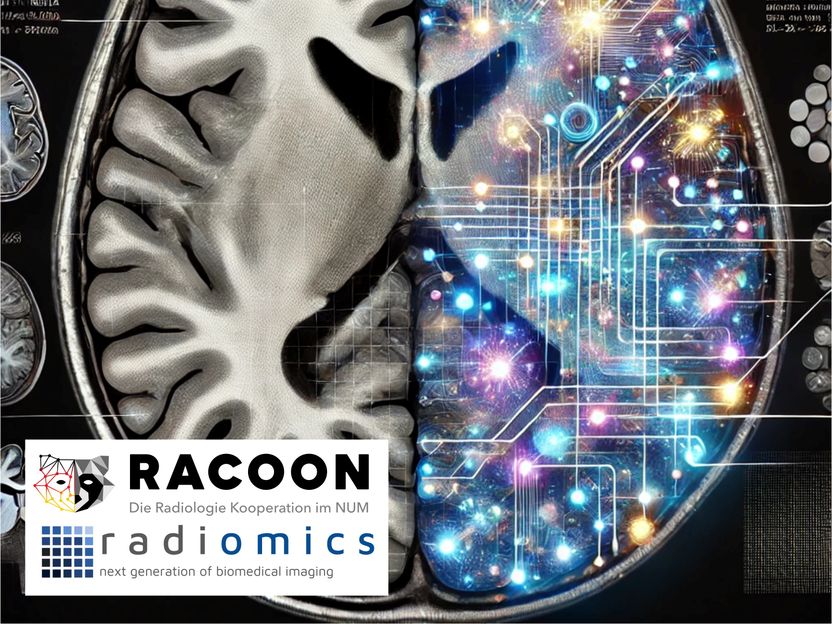New research collaboration: The future of biomedical image analysis
Advertisement
Thousands of radiological images are taken every day, providing valuable insights into disease progression. The Germany-wide RACOON network and the SPP2177 priority program are pooling their expertise so that this data can be evaluated faster and more precisely in future. Together, the researchers want to develop new AI-supported methods that can significantly improve diagnostics and therapy.

This AI-generated collage illustrates that algorithms can recognize information in radiological images that would otherwise remain hidden to the human eye. The scientists are making use of this advantage.
Prof. Dr. Dr. Jens Kleesiek - DALL-E/OpenAI
Every day, thousands of radiological images are produced across Germany that tell us more about diseases. Two large groups of experts in the RACOON consortium and the priority program SPP2177, which are now cooperating, are researching how these data volumes can be evaluated faster and better in the future. Prof. Dr. Dr. Jens Kleesiek from the Faculty of Medicine at the University of Duisburg-Essen explains what the new consortium means for health-related research and care in Germany.
RACOON has been connecting all university radiology centers in Germany since 2020 - that's 38 locations and almost 400 employees. The German Cancer Research Center in Heidelberg, the Fraunhofer Institute for Digital Medicine MEVIS in Bremen and the Technical University of Darmstadt are also involved. The RACOON network, which is funded by the Network University Medicine (Federal Ministry of Education and Research), makes radiological images usable for both local and central analysis.
And this is where the priority program SPP2177 Radiomics, funded by the German Research Foundation, comes into play. In more than 15 sub-projects across Germany, the aim is to improve the diagnostic and prognostic value of medical imaging by integrating radiomics and advanced image interpretation approaches, for example with artificial intelligence. Software solutions are also being developed to interpret data in a matter of seconds using algorithms. Findings from the NAKO - the largest population-based long-term study on health in Germany - are also being incorporated. Complex data collections can be searched for patterns using powerful mainframe computers, artificial intelligence and deep learning. This provides valuable information on comparable cases, probable disease progression and suitable therapies. The SPP2177 is headed by Prof. Dr. Fabian Bamberg, Director of the Department of Radiology at the Freiburg University Medical Center.
The diverse tools from the priority program are now to be put into clinical practice. "Basically, you can think of it like an app store," explains Professor Kleesiek, Director of the Institute for Artificial Intelligence in Medicine at Essen University Hospital. "We have created an ecosystem in RACOON, which is now being supplied with software from the priority program." This involves all diseases for which imaging techniques are used in treatment.
"The more we know, the better research and medical care will be," summarizes Bamberg. The evaluation of huge amounts of data (big data) leads to better therapeutic approaches and more individualized treatments. The cooperation has been running since the beginning of the year and is financed by both networks from existing funds. The first SPP projects should be connected to the RACOON consortium by the end of 2025.
Note: This article has been translated using a computer system without human intervention. LUMITOS offers these automatic translations to present a wider range of current news. Since this article has been translated with automatic translation, it is possible that it contains errors in vocabulary, syntax or grammar. The original article in German can be found here.
Other news from the department science
Most read news
More news from our other portals
See the theme worlds for related content
Topic world Diagnostics
Diagnostics is at the heart of modern medicine and forms a crucial interface between research and patient care in the biotech and pharmaceutical industries. It not only enables early detection and monitoring of disease, but also plays a central role in individualized medicine by enabling targeted therapies based on an individual's genetic and molecular signature.

Topic world Diagnostics
Diagnostics is at the heart of modern medicine and forms a crucial interface between research and patient care in the biotech and pharmaceutical industries. It not only enables early detection and monitoring of disease, but also plays a central role in individualized medicine by enabling targeted therapies based on an individual's genetic and molecular signature.
















































